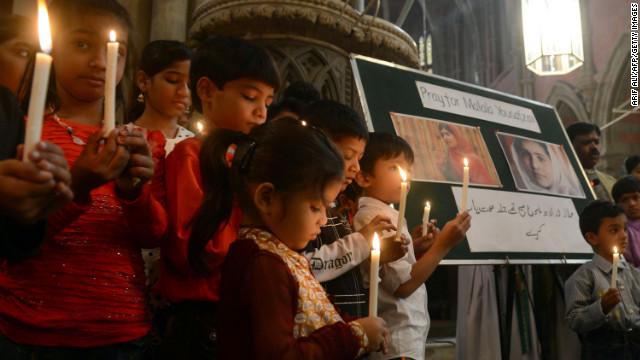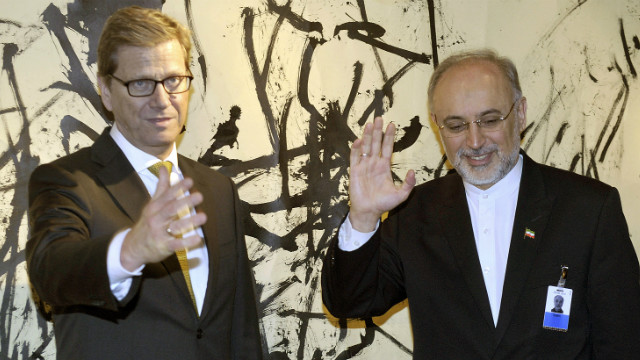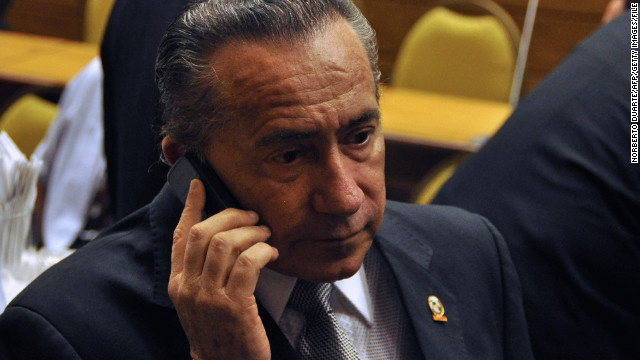(CNN) -- Eleven-year-olds sometimes have trouble sleeping through the night, kept awake by monsters they can't see.
But Malala Yousufzai knew exactly what her monsters looked like.
They had long beards and dull-colored robes and had taken over her city in the Swat Valley, in northwestern Pakistan.
It was such a beautiful place once, so lush and untouched that tourists flocked there to ski. But that was before 2003, when the Taliban began using it as a base for operations in nearby Afghanistan.
The Taliban believe girls should not be educated, or for that matter, even leave the house. In Swat they worked viciously to make sure residents obeyed.
 Photos: Supporters rally behind Malala
Photos: Supporters rally behind Malala
Hospital scans show Malala head injury
Thousands rally for Malala
Pakistanis outraged by Taliban attack
But this was not how Malala decided she would live. With the encouragement of her father, she began believing that she was stronger than the things that scared her.
"The Taliban have repeatedly targeted schools in Swat,"
she wrote in an extraordinary blog when she was empowered to share her voice with the world by the BBC.
She was writing around the time the Taliban issued a formal edict in January 2009 banning all girls from schools. On the blog, she praised her father, who was operating one of the few schools that would go on to defy that order.
"My father said that some days ago someone brought the printout of this diary saying how wonderful it was," Malala wrote. "My father said that he smiled, but could not even say that it was written by his daughter."
Now that active and imaginative mind could be gone.
On Tuesday, October 9, gunmen shot Malala in the head and neck.
Now 14, she was coming home from school in a van with other schoolchildren when Taliban assassins stopped the vehicle, climbed on and demanded that the children identify her. Terrified, the children did it and the men fired, also wounding two other girls.
"We do not tolerate people like Malala speaking against us," a Taliban spokesman later said, as Malala, in a Pakistani hospital, breathed with the help of a ventilator.
The Taliban would come for her again if she managed to survive, the spokesman threatened.
Since October
she has been in Great Britain receiving top medical care from an international team of doctors. On Wednesday, doctors announced that she is expected to undergo further surgery in Birmingham, to repair her skull.
"I shall raise my voice"
Malala looks the same today at 14, as she did at 11, like a child. But with each interview she gave to
Pakistani and international reportersbetween 2009 and 2012, she sounded more like an adult.
She rarely showed fear, and she didn't hide her face.
"I have the right of education," she said in
a 2011 interview with CNN. "I have the right to play. I have the right to sing. I have the right to talk. I have the right to go to market. I have the right to speak up."
Why do you risk your life to raise your voice? a reporter asked her.
In perfect English, she answered that her people need her.
"I shall raise my voice," she insisted.
"If I didn't do it, who would?" she said.
Girls who are scared should fight their fear, she said.
"Don't sit in your bedrooms.
"God will ask you on the day of judgment, 'Where were you when your people were asking you ... when your school fellows were asking you and when your school was asking you ...'Why I am being blown up?'"
Like father, like daughter
In January 2009, Malala and her father sat in their living room drinking tea and eating beef and curry stew.
It was the night before the Taliban had issued their edict against girls in school.
Ziauddin Yousufzai was beside himself. He knew he would have to close one of the private schools he ran for girls.
He knew it meant his daughter's education would come to an end.
Yousufzai grew up in the Swat area with little access to educational resources, but he had a natural passion for learning and literature. He was devastated that his daughter would be robbed of those pleasures.
That's according to
Adam Ellick, a reporter with the New York Timeswho filmed a
2009 documentary about Malala and her father and the Taliban's campaign against girls' education.
Ellick spent months with the father and daughter and formed a deep friendship with them.
"Ziauddin had a revolutionary zeal and deep commitment to education,"
Ellick said this week. "This charming little girl, she is a mini-version of him in many ways. She loves school, homework. Whenever she would meet me she had a bookbag full of books."
"She didn't have that idealistic activist attitude when she's 10 and 11, because who does?" Ellick said. "Her situation demanded that she grow up before she should have. She caught his contagious commitment and idealism."
In the family's living room in 2009, Yousufzai lovingly put his palm atop his daughter's head.
He said he fell in love with her the minute she was born.
"A newborn child ... I looked into her eyes," he said. "I love her ... I love her."
Yousufzai explained what he thought of the Taliban, revealing a daring spirit.
He felt enormous pressure, but the family wasn't going to just leave Swat.
That was not what he was teaching his children.
"(The Taliban) left my people in hard days," he said, trying to find the right words in English.
"I should be beside them. This is my duty. And if I die for it, I think there would be no better chance for me to die than this."
Hundreds of schools torched
It was, without a doubt, a huge risk to educate girls in Swat around this time.
One need only look at the headlines in the region. "Militants destroyed 125 girls' schools in 10 months,' the Pakistan
newspaper Daily Times reported in August 2008.
Human rights workers and aid agencies held a seminar in the area in 2008 to try to voice their concerns. They said Pakistani politicians and leaders were not listening.
Between 2007 and March 2009, 172 schools were shelled, blasted, demolished or ransacked. About 23,000 girls and 17,000 boys could no longer go to school, according to the
United Nations High Commission on Human Rights.
In October 2010, months after massive floods caused widespread devastation in Pakistan, the Taliban stepped up its bombing campaign against schools that defiantly continued to educate girls.
For girls who weren't hurt, fear that they would be accomplished the Taliban's objective. Parents kept their daughters home to protect them.
In her BBC blog, Malala wrote on the eve of the edict that she had just ended her routine winter break from school. Usually before break, the principal would announce when classes would resume.
But this time, the principal didn't.
"I was in a bad mood," Malala blogged.
Vacation was normally fun but no one was in the mood to celebrate.
But what do you do when you're 11? You go to the playground and you play, so that's what they did.
Some of the girls said they thought everything would work out. They'd be back, they said.
Malala wanted to be hopeful, too. But before she left, she turned around and took one long look at the building.
Ice cream and diplomacy
Malala was right about the edict and what it meant.
After January 2009, she was forced to stay at home and read books, Ellick said.
Eventually she was moved around the country where she attended ad-hoc schools.
She still loved stories, and she always would.
Malala wondered on her blog if she should adopt a pen name -- Gul Makai.
Meaning corn flower in Urdu, the native language of the region, Gul Makai is a name taken from a character in a Pashtun folk story. It's not well known, but Pashtun experts say the story is a kind of Romeo and Juliet tale. It's a sweet love story laced with tragedy.
It's the kind of story that a young girl would know and would romanticize.
This was Malala. She toggled between two existences.
She was a global symbol of girls' rights but also just a kid.
In 2010 she met with U.S. Special Envoy to Pakistan and Afghanistan Richard Holbrooke.
Ellick remembers being with Malala in a coffee shop after the meeting.
"She said, 'I want to get ice cream...I love vanilla ice cream,'" Ellick recalled. "Here is this girl that can go from being at a negotiating table, a high-level diplomatic meeting, but she also wanted ice cream."
Ellick remembered another time when they were out shopping in Islamabad, having fun and hunting for English language books and DVDs.
"I was disappointed that she wanted some trashy American sitcoms," Ellick laughs. "I kept telling myself, 'I know you want her to want to watch a documentary about Sierra Leone but she is just a girl.'"
Using the Quran, Malala's way
Malala told Geo TV in Pakistan in 2012 that the Taliban could do whatever they liked, but she was still going to get an education.
"We live in the 21st century," Malala said. "How can we be deprived from education?"
Those were bold words, the kind the world knows so well now.
But Malala wasn't always this way, Ellick said.
When he first met Malala, in tow with her father, she was kind of bashful.
"She wasn't as confident then as she has become," he said. "They've received attention and awards. They felt like their labor was paying off."
But could a 14-year-old really fully appreciate that words, however inspiring, could get her killed?
A CNN reporter asked her last year what she would do if she were president of Pakistan.
She said she'd tell the Taliban that girls must be educated.
The reporter pressed her hard. These guys have guns and bombs. You're just a kid, you do as you're told, they would tell her.
She stammered a little, understandably flustered.
If they didn't want to talk, she said, she would use the holy book they used to justify their brutality.
Nowhere in the Quran, Malala said, does it say that girls should not be allowed to go to school.













